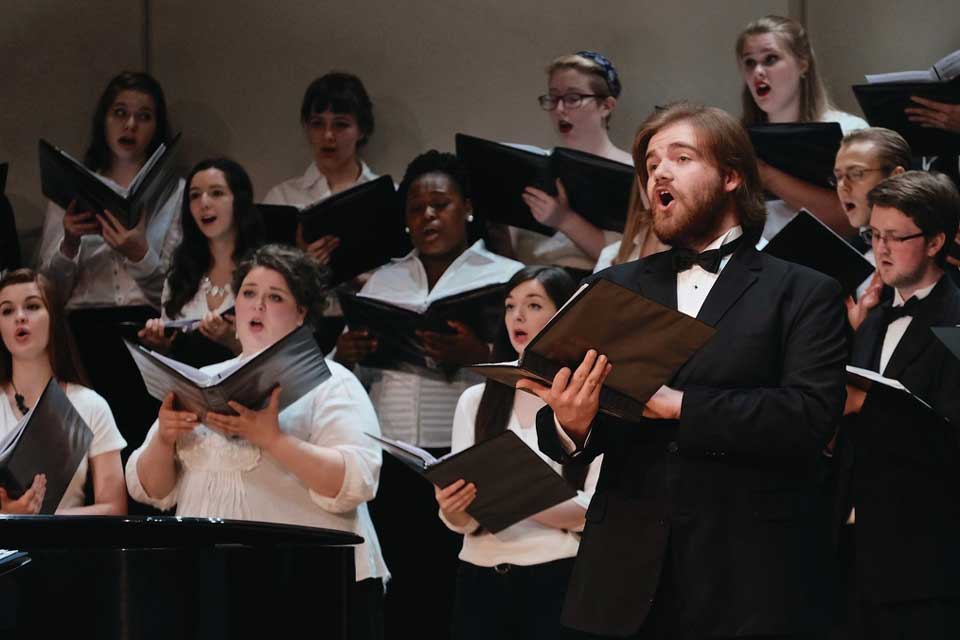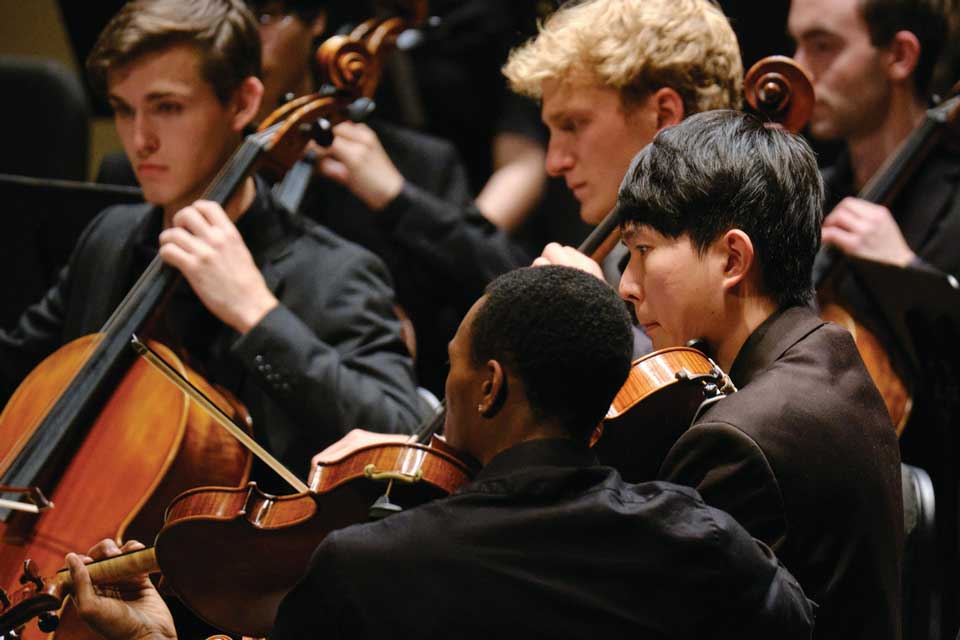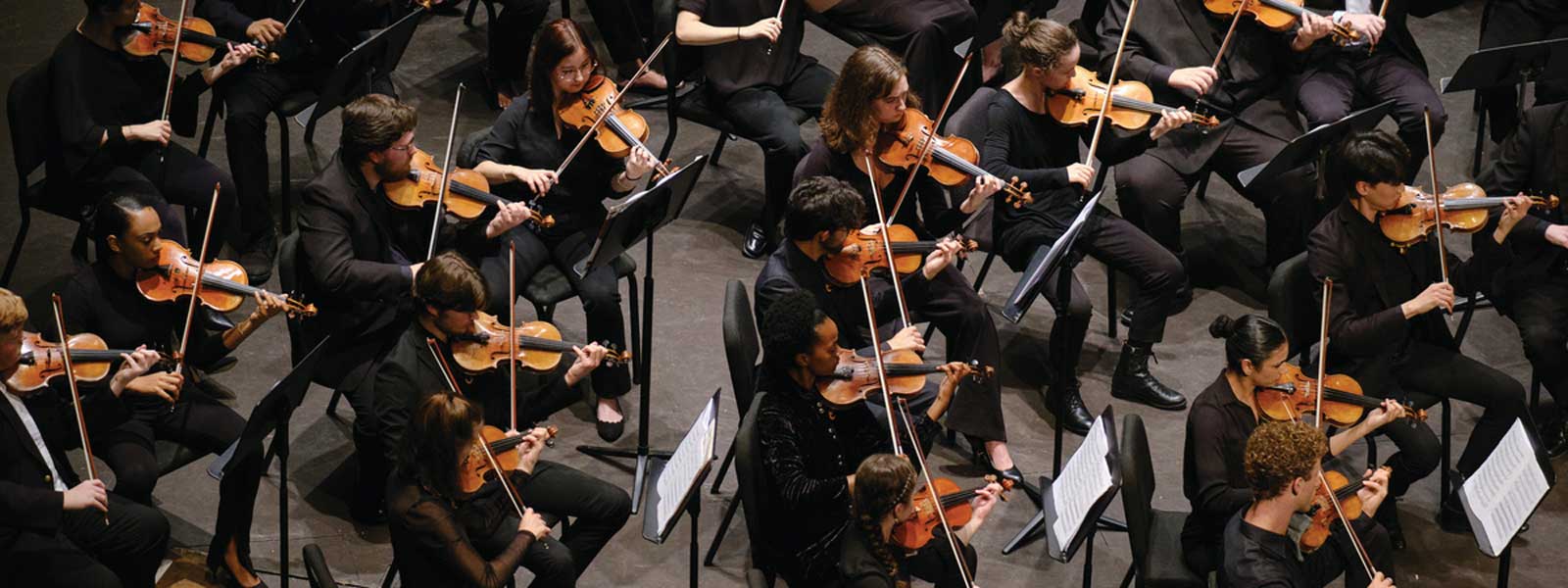UNCSA Symphony, Cantata Singers and Fletcher Opera fellows to perform Handel’s “Jephtha”
The School of Music presents the UNCSA Symphony Orchestra and Cantata Singers, along with soloists from the A.J. Fletcher Opera Institute, who will join forces to perform George Frideric Handel's final oratorio, “Jephtha,” in a concert that will bring dozens of student musicians to the Stevens Center stage, conducted by James Allbritten.
The concert is Saturday, Nov. 19, at 7:30 p.m. in the Stevens Center, 405 W. Fourth St. Tickets are $20 regular, $15 for students with I.D. on our website or 336-721-1945.
The Baroque oratorio, Handel’s last significant work, with a libretto by Thomas Morell, tells the Old Testament story of Jephtha, who is first cast out by the Israelites and then recalled when he is needed to lead an army against the Ammonites. Jephtha promises God that he will sacrifice the first creature he sees when he returns from battle triumphant. To Jephtha’s dismay, his only daughter, Iphis, runs out to greet him after his victory on the battlefield.

UNCSA Cantata Singers in Crawford Hall / Photo: G. Allen Aycock
In the original story, Iphis is sacrificed to keep Jephtha’s promise to God. But Handel and Morell employ deus ex machina, a plot device in which a seemingly unsolvable problem is suddenly resolved by an unexpected and unlikely occurrence, to spare her.
“Deus ex machina was very common in opera from the beginning of the form,” said School of Music faculty member James Allbritten, music director of the Fletcher Opera Institute and artistic and general manager of Piedmont Opera.
At the time that “Jephtha” was first produced in England in 1752, oratorios had overtaken operas in popularity, partly because they were sung in English and because they used familiar text, often from the Bible. The form comprises arias, recitatives and choruses, and in “Jephtha,” the chorus was taking on increasing importance.
Handel is probably best known today for another oratorio, “The Messiah,” first produced in 1742.
“If you love ‘Messiah,’” Allbritten said, “you’ll be intrigued by ‘Jephtha,’ because it’s similar, but it’s different.”

UNCSA Symphony Orchestra (2022) / Photo: Wayne Reich
Two things happen in “Jephtha” that herald the musical transition from the Baroque era to the Classical era, Allbritten said: the rise of the importance of the chorus, and the addition of philosophical themes to the Baroque style of painting musical pictures. “He’s still in the Baroque but looking toward the Classical era to come.”
Allbritten continued: “There is a recitative before one of the big battle choruses. The recitative is like the 6 o’clock news teasing to the 11 o’clock news, and the chorus is like the ‘News at 11,’ because it is so chock-full of information.
“It is beyond the typical Baroque, which was all about ‘let’s paint a picture,’ and it gets very philosophical,” Allbritten said. “‘The Messiah’ tells the greatest story ever told in great, broad pictures. In ‘Jephtha,’ you have this big dramatic chorus that steps out of the big broad pictures and into a thoughtful philosophical mode.”
Allbritten added: “‘Jephtha’ has moments that thrill, but it gets remarkably personal, and you get inside the character’s mind in a way that is so much more contemplative than I am used to from Handel.”
Handel was in declining health when he wrote this final major work, and his struggle with his own impending mortality comes through in the restrained beauty of this masterpiece.
“How dark, O Lord, are Thy decrees, All hid from mortal sight, All our joys to sorrow turning,” Handel wrote, while he was losing his eyesight.
“We experience the great depth of human suffering, because Jephtha realizes that he made a stupid mistake, and it is compounded by the daughter’s forgiveness,” Allbritten said. “The way Handel and the librettist change the ending, we are spared some of that suffering.
“We are not dealing with divinity but with human nature. In ‘Jephtha,’ we get to watch people be human to beautiful music.”
Allbritten
“‘Jephtha’ shows the evolution of a great oratorio composer – the story of a man with tremendous faults,” Allbritten added. “We are not dealing with divinity but with human nature. In ‘Jephtha,’ we get to watch people be human to beautiful music.”
Contact Media Relations(opens in new tab)(opens in new tab)
Get the best news, performance and alumni stories from UNCSA.
SUBSCRIBE TO OUR NEWSLETTERS(OPENS IN NEW TAB)(OPENS IN NEW TAB)(OPENS IN NEW TAB)(OPENS IN NEW TAB)(OPENS IN NEW TAB)(OPENS IN NEW TAB)(OPENS IN NEW TAB)(OPENS IN NEW TAB)
November 02, 2022






